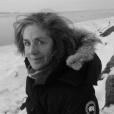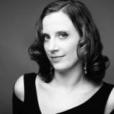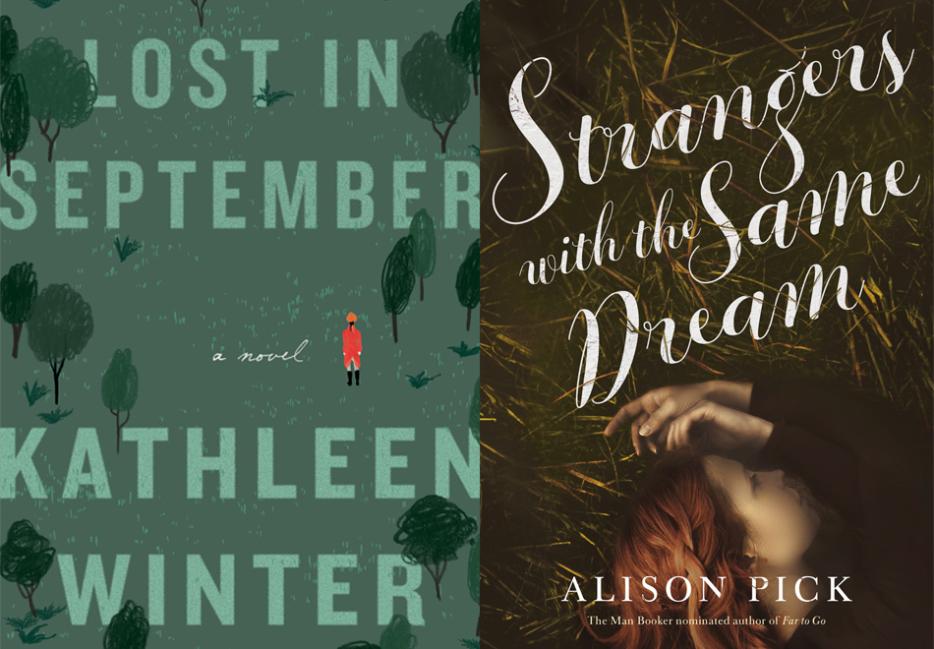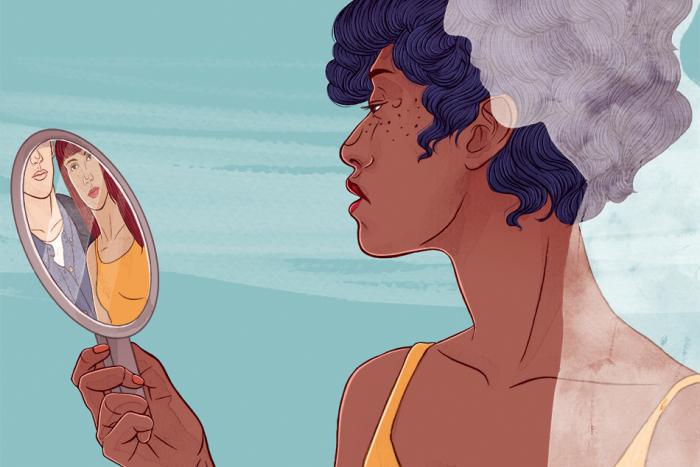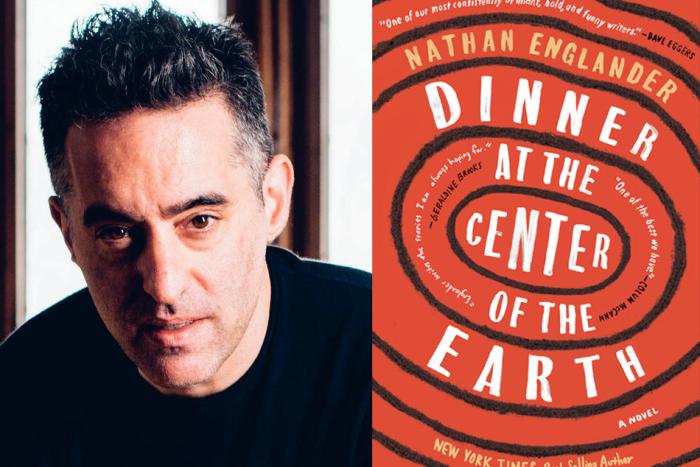Kathleen Winter and Alison Pick recently spoke over email on the occasion of the publication of their new novels—respectively, Lost in September, a powerful and contemporary reimagining of the story of the historical soldier James Wolfe, and Strangers with the Same Dream, about Jewish pioneers arriving in Palestine to escape violence in the 1920s, attempting to settle an already-populated land, and the dark ironies therein. The conversation has been lightly edited.
Kathleen Winter: Alison, it was a wondrous pleasure to read Strangers with the Same Dream. I found myself flying with ease from the book’s bird’s-eye cinematic opening upon the early Jewish settlement that was to become Israel, to the inner hearts of the characters so intimately drawn. I felt myself hovering over then being progressively drawn into intimacy, beauty, and harrowing tension. I sense we could all use your novel’s empathic vision these days. Our external social order and our inner lives feel very far apart now. Do we hold latent compassion and softness in our human-scale souls, while externally bent on expressing polarized ideologies and hard conflict? We feel this schism acutely now, yet it is intimated in your novel set nearly a hundred years ago. Can you perhaps talk a bit about this borderland of soul and society, where our visions can soar or crash, so vulnerable?
Alison Pick: I don’t know if I have an answer but I find myself agreeing with your question. As novelists, we have to be acutely tuned in to our inner lives, and I can’t help but think the world would be a better place if it was set up to afford everyone this opportunity. And yet, as you suggest, very little in our society supports the development of empathy. Capitalism, of course, is concerned with acquiring goods rather than compassion; social media, where so much of our discourse now takes place, seems lately like it’s largely about pitting groups against each other rather than finding common ground. How do we navigate a world where people of colour can be shot in the streets with no recourse, where our First Nations don’t have access to clean drinking water, where white supremacists march in the streets of Charlottesville chanting “Jews will not replace us”? For my part, I continue to write, which feels hugely inadequate and the only thing I know how to do. On one hand, making art is a radical and political act. To carve out time for something that is not financially rewarding is in direct contradiction to what capitalism teaches us. And yet I am acutely aware of the vast—astronomical—privilege that allows me to spend hours at my desk instead of cleaning toilets or labouring in fields or sitting in an office cubicle.
How should I live? How should I write? I try to keep leaning into these questions.
I find, too, that the questions are intimately related. A novelist’s job, or one of them, is to infuse her characters with subtlety. We are all filled with contradictions, thinking one way and acting another, and these contradictions are part of what brings a character to life. Can we find the soft heart that you refer to for ourselves and our society as well as for our characters?
Sophie in your new novel, Lost in September, seems to embody many of these traits. She is a rebel and a free spirit, a fierce intelligence, and filled with contradictions. What was it like to write her character? What is the relationship between the author and her characters in your own experience? What kinds of characters do you like to write and how do you succeed in bringing them to life?
KW: Sophie, who gives the modern-day James Wolfe a place to sleep in her tent camped out in Montreal’s Parc Mont-Royal, is probably the most made-up character in Lost in September, like Thomasina in Annabel. I mean, I borrowed things I’ve witnessed or experienced—I’m married to a man who has worked at a homeless shelter as she does, and I’ve cleaned out toilets in early stints as a home care worker between freelance writing jobs and having stories published in little magazines. And I’ve based her, visually, on a couple of people I have known and can visualize. But beyond these anchors, Sophie is the most fictional character in the novel. Whereas the others are drawn from life more directly. And where I find them is in the margins.
This morning I walked down by the St. Lawrence River, where I have the James Wolfe character hang out and where I do walk daily, and the city has fenced off a big section where they are going to make a beach. They’ve cut down a stand of poplars and have marked orange stain around the chokecherry trees I harvested earlier this summer for jam. Nobody can go down there now. The man who listens to his transistor radio on a big rock in my novel can’t get in there anymore. The guy with dreadlocks who takes a morning bath all year round has to go somewhere else. This was a derelict, forgotten bit of the river, where cracked cement met wild reeds, and you could go and see a hundred and fifty kinds of wild flowers. Now it’s going to be gentrified, as is my whole neighbourhood. The other night some condo developers came in and put up a big fairground tent and gave a thousand dollars worth of miniature smoked meat sandwiches and beet salads with feta cheese balls to the panhandlers and the lipstick lady and the old people on sidewalk scooters. The developers gave us all a PowerPoint presentation on the new six-storey condo with businesses on the ground floor that is going up. The developers called the night a public consultation.
I wanted James Wolfe to see what has become of the Canada he won for England. I guess Sophie is his ticket to this world. He can’t afford a hotel room. I wanted him to be shown around by somebody with a critical eye and a kickass woman’s viewpoint. I wanted her to help him come out of the 1750s and into today. I wanted her to help him make sense of Quebec and North America in 2017, and to face some of the consequences of what we call history.
And consequences are something I wanted to ask you about as well. To me, Strangers with the Same Dream is deeply concerned with interwoven cause and effect. The candlesticks, the tractor, the gruel—everything has repercussions and their connectedness is beautifully shown in the story. How do you feel about the way this works in life experience? I find that it takes a certain depth and repeated learning and perhaps insight to go beyond seeing events as independent, and to start feeling the weight or the possible weight of influences, which can be subtle, or largely undetected for minutes, days, years. In a way, do we maybe learn to foretell certain aspects of the future?
AP: One of the gifts of writing memoir—I wonder if it’s the same for you?—is that it affords the chance to look back on individual events and see them as part of a larger narrative. The events in my memoir Between Gods take place during a terribly difficult time in my life, and yet the act of writing them down gave them meaning and infused my depression with a kind of redemption I’m not sure it would have had otherwise. Events as I experience them in the forward flow of linear time seem, as you so aptly say, independent, but a memoirist is given the chance to linger with them, examine them, and otherwise understand them anew. Which is to say, to appreciate the weight of influences, how one event foretold the next and then the next in a way I could not have apprehended as I experienced them.
The other thing that occurs to me in response to your question about telling the future is the role that our bodies play in understanding things that are not necessarily logical. Despite what I might say to a classroom full of students about making sure a story lines up logically, the tool I rely on most in my own writing is a kind of embodied intuition. If a scene doesn’t feel right, I have learned to respect the little niggle and to cut it regardless of how it seems it should fit. And although it does not come as easily to me as it does in my writing practice, I try to use the same criteria for making decisions in my personal and emotional lives. To trust that there is some perhaps unnamable intelligence around us much greater than our own egos, and to listen to it.
This kind of “feeling into things” is difficult to render in words, and you did it so beautifully in Boundless (as well as in both your novels). Can you talk a bit about how you transposed your inner awareness of the land you were traveling through onto the page?
I am also curious, from a writerly perspective, to hear about the great success of Annabel. In a way, what happened with that novel is every writer’s dream. And yet I know from my own (more limited!) experience that success in the external world sometimes comes with its own set of issues, both in terms of the writing life itself and in terms of how one orients oneself to the world. Could you tell us a bit about what that was like for you?
KW: Yes, the power of the north is something I had to try to relate in both Annabel and Boundless, and Lost in September is very much about the Saint Lawrence River, and about Quebec City and Montreal, as well as the land around Culloden battlefield and other parts of Britain—Wolfe’s homeland. It’s also set in psychic homelands of fear, war, kinship, and loneliness. I don’t know how I put territory on the page—I just try to completely feel a place in my animal body, without trying to translate it right away into words. I go down by the river and stand barefooted on its bank under a tree, and I let the whipping river, the muscle of it, hit me, and then the clouds, and the tree itself, and the vegetation and the mud. Everything is making noises or has noises in it, and the wind feels like silk in summer or like knives in December and I feel that. I walk for miles and feel the ground. The ground is important to my writing. I don’t know what I’m doing when I’m taking in the force of place, or of emotion. I do know what I’m doing later, when time has passed and I can find words. It’s like that with writing anything, isn’t it. Emotions—all life’s shocks, death, shame, lust, regret. It all starts out as a wordless Morse code between life and the body, and then we spin it into a line that we hope coheres. But any words I’ve found are a half-inked map or chart to territory I still find pretty much unknown.
About Annabel—yes, Anansi published it well, it found readers, and is still finding readers. Robert Chafe, artistic director of Artistic Fraud, is turning it into that company’s first fully-sung stage musical. Deepa Mehta has optioned it for film and has been sending me exciting updates. My daughter Juliette has collected many translations so we have an archive of it in all its languages. I’m very grateful, to my publisher and to readers, for the book’s success. Still, in the quiet night, I am empty and alone, and wordless. My next book, if there is one, will come out of the same void. So, I don’t feel any new layer of self as a result of the work or its success. But I do feel overjoyed to be able to practice the only craft I know how to do.
I wanted to ask you a question about transcendental passages in your writing. For instance, in chapter three of Strangers with the Same Dream, the paragraph that starts with crickets singing in the tall grass opens into a beautiful passage about a world in which everything is trying to give birth to love. Can you talk a little about writing the transcendental or sacred, and how it relates to your view of the world at large?
AP: The world seems, at its core, entirely unknowable to me, and I think of writing as an attempt to evoke that mystery rather than to harness it or pin it down. And there is something, too, in the act of writing that is, for me, both transcendental and sacred. It’s difficult to talk about, of course, without falling into cliché. But I find the hours where I am fully absorbed in my writing to be the best hours of my life—when I am both fully present and also somehow absent. It’s akin to a spiritual practice in the sense that it involves abdicating the ego, quieting the mind, and listening to that intuition we were speaking about earlier. Your description of walking by the Saint Lawrence River is so gorgeous and compelling—and I could feel the fruits of that ritual so clearly in the pages of Lost in September.
On different (although perhaps tangentially related?) note, I have been thinking recently about what it means to be a mid-career, middle-aged woman who writes. About the ways that everyday sexism informs publishing, and readership, and reviews, and likewise about how being a mother both hinders and bolsters my writing. Do these questions keep you up at night or have you found peace with them? How does being female intersect with your identity as a writer and with your writing practice?
KW: I’ve had editors and publishing colleagues who are all powerful women: Lynn Henry, Janie Yoon, Sarah MacLachlan, Shaun Bradley. I’ve experienced frank, direct and motivating give-and-take from them. When it comes to pay parity, I share information with other authors and find out if we are being offered equal pay for similar work. I talk about money with women and men. When I get offered work without the mention of money I start the discussion about payment and get a contract settled. I decided a long time ago not to accept payment in mugs and tote bags unless I am consciously giving to a cause I want to support. I’m not saying I haven’t experienced everyday sexism. When I was a young freelance journalist I confronted it daily. But I have not to my knowledge experienced it in the book world. Reviewers have taken my work seriously. Publishers have not wanted to upholster my book covers with flowers or spread naked reclining women across those flowers. Margaret Atwood told me a publisher recently wanted to cover a book of hers in flowers and she wouldn’t let them. She made them use a crow.
Motherhood and writing! Now with my daughters 20 and 28 I’d say becoming a parent blasted me open and made me spill far better words. Earlier, with small children, I had to learn how to drive so I could get in the car and use it for personal writing getaways, which I conducted parked in snowstorms at bleak bits of lands-end all over eastern Newfoundland. I was half crazy with a hunger for solitude at times so I could write.
In your new novel, motherhood is called its own kind of madness. Motherhood figures largely in the story. You have a daughter as I have daughters. There are parts of my new novel that I could not have written without having my daughters, and I wonder how you feel your own motherhood has, in part, shaped Strangers with the Same Dream.
AP: Motherhood has made me a feminist in a way that no other experience in my life has—both raising a daughter, seeing the way the world responds to her, and also my own challenges navigating what feel like competing desires to be a good mother and a good writer. And to enjoy the immense pleasures of each of those practices. Our society is not set up for this—a huge amount of pressure is placed on the nuclear family unit. The characters in Strangers With the Same Dream live all together on a kibbutz, one of the great experiments in communal living of the 20th century. One of the ideas behind the kibbutz was to free women so they could participate in the life of the group (in this case farming). But Strangers With the Same Dream is set in the 1920s and although equality was given lip service it was not fully realized in practice (as it is still not today). All decisions on the kibbutz were meant to be made by consensus, but there are photos of group meetings where the men were debating and the women were in the background quietly knitting. The women’s journals I was able to access through the archive where I did my research show the frustration that many of these women felt at not being equally valued. I wanted to explore the intersection between sexism and motherhood in the novel, the way that the task of nurturing children is deeply undervalued, and to show through the relationship between Hannah and her daughter Ruth the particularly profound, bottomless love that can accompany childrearing. To push these two things up against each other: being a mother is, or can be, both the most exhausting thing in the world and also the most profoundly rewarding.
I could not have written this novel without the experience of being mother to my daughter. Now that she is a little older (she just turned eight) she understands my writing in a way she couldn’t when she was tiny. She’s beyond excited for my launch (which will be hosted by Ben McNally who is a legend to her—the last time I launched a book at his store he gave her candy!).
Kathleen, I have an image in my mind of you in the hospitality suite at the International Festival of Authors with your daughter Juliette. It seemed so wonderful to me that she was at the age where she could accompany you, and I imagined the pride she must have felt at seeing you in your element. I’m glad to now be a little closer to that. I also remember a conversation we had in which you told me that it’s good for daughters to see their mothers as active participants in the world, as women who accomplish things and who are successful in their fields. Whenever I’m feeling guilty about being away on book tour, or about leaving my daughter to take time to write, I think about your encouragement and feel bolstered. Thank you.
I’ll end with a question that I confess I don’t like being asked, but that I’m curious about when it comes to other writers: what’s next for you? Do you have a new project in mind? How are you feeling about going out into the world with Lost in September and what comes after?
KW: I haven’t yet heard any readers’ responses to the new novel and try not to imagine scenarios. I yesterday received my box of authors’ copies by mail, which is always a thrill, as you know. As for what’s next, I’ve spent two years wandering around in the 18th century and feel it’d be a shame to leave it so soon. On the other hand, I’m interested in things I see happening today in my own neighbourhood in Montreal. So I have a 1700s notebook and a contemporary scratchpad in progress. I can’t say what might come out of these.

